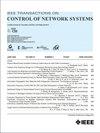An Interval-Appointed Looped-Functional Approach for Switching Event-Triggered Systems With Input Saturation and Its Application to Memory-Based Event-Triggered Control
IF 4
3区 计算机科学
Q2 AUTOMATION & CONTROL SYSTEMS
引用次数: 0
Abstract
This article first presents an interval-appointed looped-functional approach for the stability of switching event-triggered (SET) control systems with input saturation. In order to improve the resource utilization of the networked control system while maintaining satisfactory system performance, a memory term and a dynamic triggering threshold are introduced into the existing SET scheme. Thus, a dynamic memory-based SET (DMSET) scheme is newly designed. To analyze the stability of the controlled system, a useful lemma is established in which an interval-appointed looped-functional is constructed, and a combined Lyapunov method is developed accordingly to derive a relaxed stability criterion. This method contributes to discarding the positive definiteness of certain Lyapunov matrices in the interval-appointed looped-functional and lays a groundwork for the stability analysis of other SET-based saturated control systems. As an application, an LMI-based less conservative stability criterion for DMSET control systems is then derived. Two optimization algorithms are given to maximize the estimates of the region of attraction and the permissible length of the sampling period, respectively. In the end, the advantages of the interval-appointed looped-functional approach and the DMSET scheme are demonstrated by two illustrative examples.具有输入饱和的切换事件触发系统的区间指定环函数方法及其在基于记忆的事件触发控制中的应用
本文首先提出了一种区间指定的环函数方法来研究具有输入饱和的开关事件触发(SET)控制系统的稳定性。为了在保证系统性能的同时提高网络控制系统的资源利用率,在现有的SET方案中引入了记忆项和动态触发阈值。为此,本文设计了一种基于动态内存的SET (DMSET)方案。为了分析被控系统的稳定性,建立了一个有用的引理,在此引理中构造了一个区间指定的环泛函,并据此建立了一个组合Lyapunov方法,导出了一个松弛的稳定性判据。该方法摒弃了区间指定环泛函中某些Lyapunov矩阵的正确定性,为其他基于set的饱和控制系统的稳定性分析奠定了基础。作为应用,推导了基于lmi的DMSET控制系统的小保守稳定性判据。给出了两种优化算法,分别最大限度地估计了吸引区域和允许的采样周期长度。最后,通过两个实例说明了区间指定循环函数方法和DMSET方案的优点。
本文章由计算机程序翻译,如有差异,请以英文原文为准。
求助全文
约1分钟内获得全文
求助全文
来源期刊

IEEE Transactions on Control of Network Systems
Mathematics-Control and Optimization
CiteScore
7.80
自引率
7.10%
发文量
169
期刊介绍:
The IEEE Transactions on Control of Network Systems is committed to the timely publication of high-impact papers at the intersection of control systems and network science. In particular, the journal addresses research on the analysis, design and implementation of networked control systems, as well as control over networks. Relevant work includes the full spectrum from basic research on control systems to the design of engineering solutions for automatic control of, and over, networks. The topics covered by this journal include: Coordinated control and estimation over networks, Control and computation over sensor networks, Control under communication constraints, Control and performance analysis issues that arise in the dynamics of networks used in application areas such as communications, computers, transportation, manufacturing, Web ranking and aggregation, social networks, biology, power systems, economics, Synchronization of activities across a controlled network, Stability analysis of controlled networks, Analysis of networks as hybrid dynamical systems.
 求助内容:
求助内容: 应助结果提醒方式:
应助结果提醒方式:


